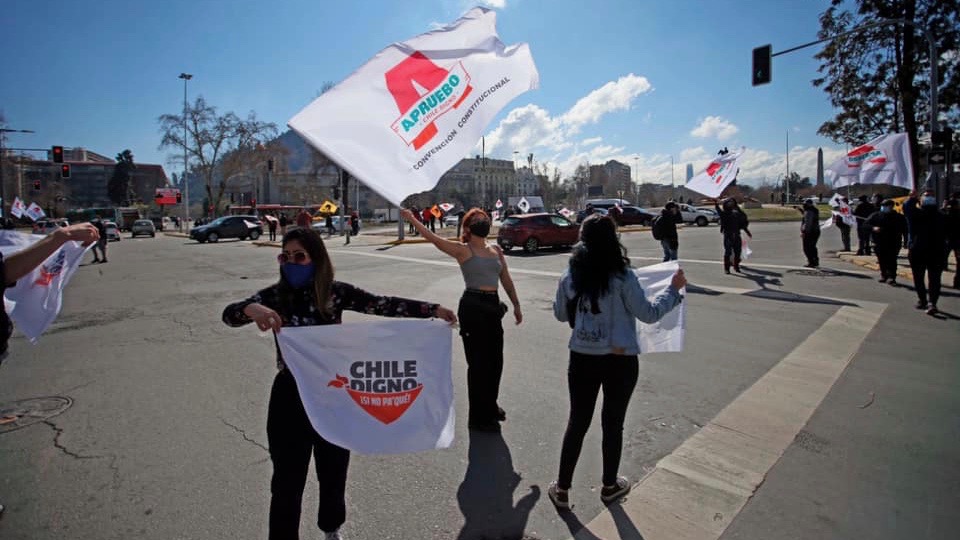Chilean senators Guido Girardi, of the Party for Democracy (PPD), and Pedro Araya, of the Christian Democratic Party (DC), on September 1, presented a reform bill that seeks to modify the recently-enacted the Safe Referendum Law, so that the people who have tested positive for COVID-19 are allowed to vote in the constitutional plebiscite scheduled for October 25.
Last week, on August 25, Chilean president Sebastián Piñera promulgated the Safe Referendum Law that gives special powers to the Electoral Service (SERVEL) to take necessary sanitary and security measures for holding safe elections. The law allows the SERVEL to decide the extension of voting hours, implementation of health protocols, among other measures. It also allows the electoral authority to decide whether or not to allow people infected with coronavirus to vote.
Following the enactment of the law, several officials of Piñera’s administration expressed themselves against the presence of COVID-19 patients during the voting process, including health minister Enrique Paris.
On August 28, interior minister Víctor Pérez held a press conference after a meeting with the SERVEL and announced that people infected with COVID-19 and those in close contact with them will not be able to take part in the referendum. Pérez said that it was not feasible to modify the legislation this close to the elections so that infected people can vote. However, the president of the SERVEL, Patricio Santamaría, contradicted the government’s position and said that there was still time to legislate. In addition, the national attorney general Jorge Abbott announced that any coronavirus-positive person caught voting on October 25 will be prosecuted.
Girardi and Araya are concerned that the increasing rate of contagion could affect the voter turnout and generate doubts regarding the legitimacy of the electoral process. With the reform, the senators demand that the SERVEL, along with the Health Ministry, devise alternative ways of voting and establish the best mechanism for the infected or suspicious patients to exercise their right to vote. Suggestions such as the use of special polling stations, implementation of electronic voting or postal voting, etc. have been supported by the opposition and various social organizations to promote the citizens’ participation.
Meanwhile, the Apruebo Chile Digno or I Approve Dignified Chile, a platform that brings together several left-wing political parties, social movements and trade unions, is campaigning to urge the citizens to vote, approve the drafting of a new Constitution and mark the option of Constitutional Convention for writing the new Magna Carta.
The volunteers from the Communist Party of Chile, Progressive Party, Social Green Regionalist Federation, Humanist Party, Equality Party, Libertarian Left, People’s Democratic Movement, Political Victory, Allendista Socialism Movement, United Center of Workers (CUT) -the trade union center of Chile-, and various social, students, women and Indigenous organizations, are using telecommunication platforms and social media networks to campaign to end the current constitution, which was written and imposed during the dictatorship of General Augusto Pinochet (1973-1990). Movements believe that this constitution has created the foundation for the rampant inequality and neoliberal economic system in the country.
The plebiscite set for October 25 was originally scheduled for April 26 but was delayed due to the COVID-19 outbreak. It will ask Chileans two questions: whether they want a new constitution or not and, if they do, what type of body should write it, a “Mixed Constitutional Convention” or a “Constitutional Convention”. The “Mixed Constitutional Convention” will have a 50% representation of congress members and 50% of elected members for this purpose. The “Constitutional Convention” will have a 100% representation of members elected by citizens for this work.
This public consultation was born from the citizens’ demands raised during the social rebellion of October 2019 that continued for almost 5 months until the coronavirus outbreak in March, when Chileans massively rejected the government’s neoliberal policies and glaring inequalities in the country and demanded a new and inclusive constitution with people’s participation.
According to various surveys conducted during the month of August, more than 70% of the citizens have said that they will go to the polls despite the pandemic.
Currently, Chile is the sixth hardest-hit Latin American country and the eleventh most affected nation worldwide by the COVID-19 pandemic. As of September 3, Chile has registered 416,501 confirmed cases of the novel coronavirus and 11,442 deaths.





